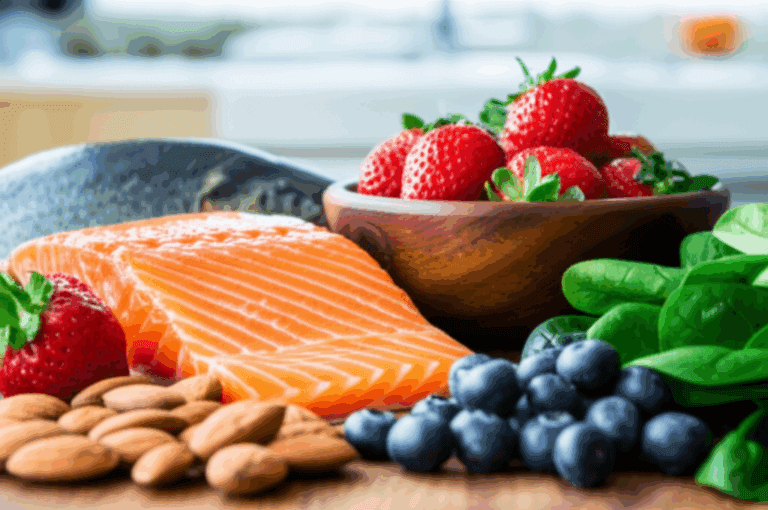Maintaining a healthy heart is crucial for overall well-being, and diet plays a significant role in achieving this. Incorporating specific heart-healthy foods into your daily meals can significantly reduce the risk of heart disease and improve cardiovascular function. Here are five such foods that you should consider consuming every day.
1. Leafy Green Vegetables: Nature’s Heart Protectors
Leafy green vegetables such as spinach, kale, collard greens, and arugula are nutritional powerhouses packed with vitamins, minerals, and antioxidants. These vibrant greens are particularly rich in vitamin K and dietary nitrates, both of which contribute significantly to heart health.
Benefits of Leafy Greens
- Promote Healthy Arteries: Vitamin K helps protect the arteries and promotes proper blood clotting.
- Lower Blood Pressure: Dietary nitrates have been shown to reduce blood pressure and decrease arterial stiffness. These nitrates improve the function of cells lining the blood vessels, ensuring efficient blood flow.
- Reduce Risk of Heart Disease: Increased intake of leafy green vegetables is linked to a lower risk of heart disease and significant cardiovascular benefits.
How to Incorporate Leafy Greens Daily
- Salads: Use spinach or mixed greens as a base for your daily salad.
- Smoothies: Add a handful of kale or spinach to your morning smoothie for an extra nutrient boost.
- Side Dishes: Steam or sauté collard greens or kale as a side dish for lunch or dinner.
- Soups: Stir spinach into soups just before serving to add vitamins without significantly altering the flavor.
2. Fatty Fish: Omega-3 Powerhouses for a Strong Heart
Fatty fish like salmon, mackerel, tuna, herring, sardines, and anchovies are excellent sources of omega-3 fatty acids. These essential fats are vital for heart health, offering a range of benefits that support cardiovascular function.
Benefits of Fatty Fish
- Reduce Triglycerides: Omega-3 fatty acids help lower triglyceride levels in the blood, reducing the risk of atherosclerosis.
- Improve Circulation: These fats improve blood circulation, preventing blood clots and maintaining a healthy heart rhythm.
- Lower Blood Pressure: Omega-3s can help slightly lower blood pressure, contributing to overall cardiovascular health.
- Reduce Risk of Heart Disease: Regular consumption of fatty fish is associated with a lower risk of developing heart disease.
How to Incorporate Fatty Fish Daily
- Main Meals: Aim to include at least two servings of fatty fish per week.
- Tinned Fish: Tinned sardines or salmon can be added to salads or enjoyed on toast for a quick and nutritious meal.
- Grilled or Baked: Prepare salmon fillets with herbs and vegetables for a heart-healthy dinner.
- Tuna Steak: Grill tuna steak with dill and lemon for a delicious and beneficial meal.
3. Oats: The Soluble Fiber Champion
Oats are a versatile and healthy grain that offers numerous benefits, particularly for heart health. They are rich in soluble fiber, specifically beta-glucan, which has been shown to lower LDL (bad) cholesterol and improve blood sugar control.
Benefits of Oats
- Lower Cholesterol: Soluble fiber in oats can keep the body from absorbing cholesterol from other foods, leading to lower LDL cholesterol levels.
- Improve Blood Sugar Control: Oats help slow the absorption of sugar, which improves blood sugar levels, especially beneficial for individuals with diabetes.
- Promote Gut Health: Soluble fiber supports gut health by feeding the good bacteria in the large intestine, producing beneficial short-chain fatty acids.
- Reduce Risk of Heart Disease: Consuming about 3 grams of oat beta-glucan daily can reduce the risk of heart disease.
How to Incorporate Oats Daily
- Breakfast Cereal: Start your day with a bowl of oatmeal, adding fruits and nuts for extra nutrients.
- Baking: Use oats to make bread, scones, and flapjacks.
- Fruit Crumbles: Incorporate oats into fruit crumbles for a healthy dessert option.
- Smoothies: Add oats to smoothies for added fiber and texture.
4. Berries: Antioxidant-Rich Heart Boosters
Berries such as blueberries, strawberries, raspberries, and cranberries are packed with antioxidants, vitamins, and dietary fiber. These compounds work together to protect the heart and improve overall cardiovascular health.
Benefits of Berries
- Reduce Inflammation: Antioxidants, especially anthocyanins, reduce inflammation and oxidative stress, decreasing the risk of heart disease.
- Improve Cholesterol Levels: Regular consumption of berries may decrease LDL cholesterol and increase HDL (good) cholesterol levels.
- Support Blood Vessel Function: Berries contain compounds that help protect blood vessels and improve blood flow.
- Potential Cancer Prevention: Anti-inflammatory and antioxidant properties may slow down and suppress the effects of various cancers.
How to Incorporate Berries Daily
- Breakfast Topping: Add berries to yogurt, oatmeal, or cereal for a nutritious start to the day.
- Snacks: Enjoy a handful of fresh or frozen berries as a healthy snack.
- Smoothies: Blend berries into smoothies for a delicious and antioxidant-rich drink.
- Desserts: Use berries in desserts like fruit salads, crumbles, or as a topping for baked goods.
5. Nuts and Seeds: Healthy Fats and Protein
Nuts and seeds such as almonds, walnuts, chia seeds, and flaxseeds are excellent sources of healthy fats, protein, and fiber. They provide essential nutrients that support heart health and help lower the risk of cardiovascular disease.
Benefits of Nuts and Seeds
- Lower Cholesterol: Plant sterols, fiber, and healthy fats in nuts and seeds help lower LDL cholesterol levels.
- Reduce Inflammation: Omega-3 fatty acids and antioxidants reduce inflammation and protect the heart’s arteries from inflammation.
- Improve Heart Health: Regular consumption of nuts and seeds is linked to a reduced risk of heart disease and stroke.
- Provide Essential Nutrients: Nuts and seeds are rich in vitamins, minerals, and antioxidants that support overall health.
How to Incorporate Nuts and Seeds Daily
- Snacks: Enjoy a small handful of nuts as a snack between meals.
- Salad Toppings: Sprinkle nuts and seeds on salads for added texture and nutrition.
- Yogurt or Oatmeal: Add nuts and seeds to yogurt or oatmeal for a boost of healthy fats and protein.
- Baking: Use nuts and seeds in baking recipes for added flavor and health benefits.
Making Heart-Healthy Choices
Incorporating these five food groups into your daily diet is a proactive step towards maintaining a healthy heart. Remember that a balanced and varied diet, combined with regular physical activity, is key to long-term cardiovascular health. Embrace these heart-healthy foods to nourish your body and protect your heart for years to come.







